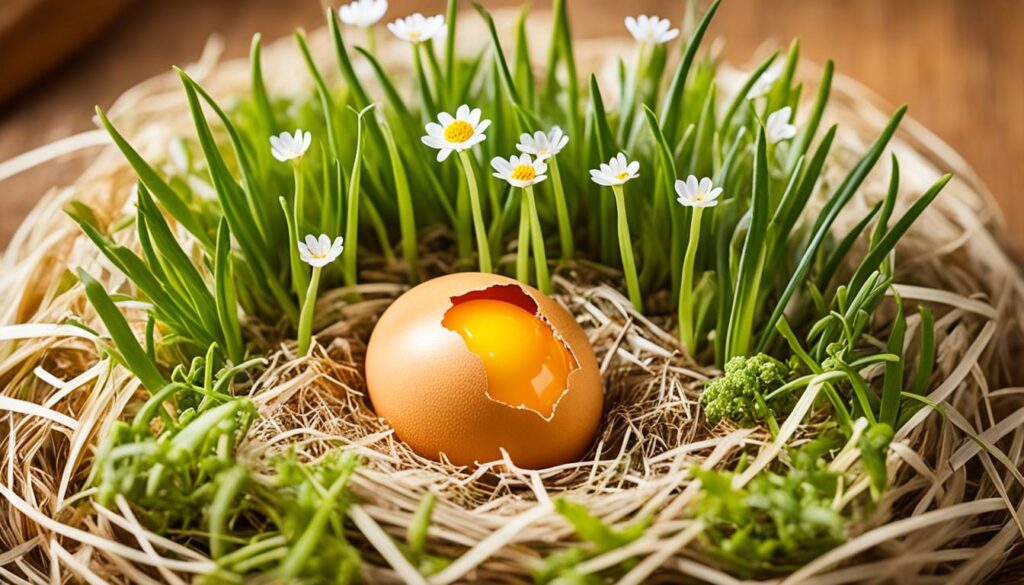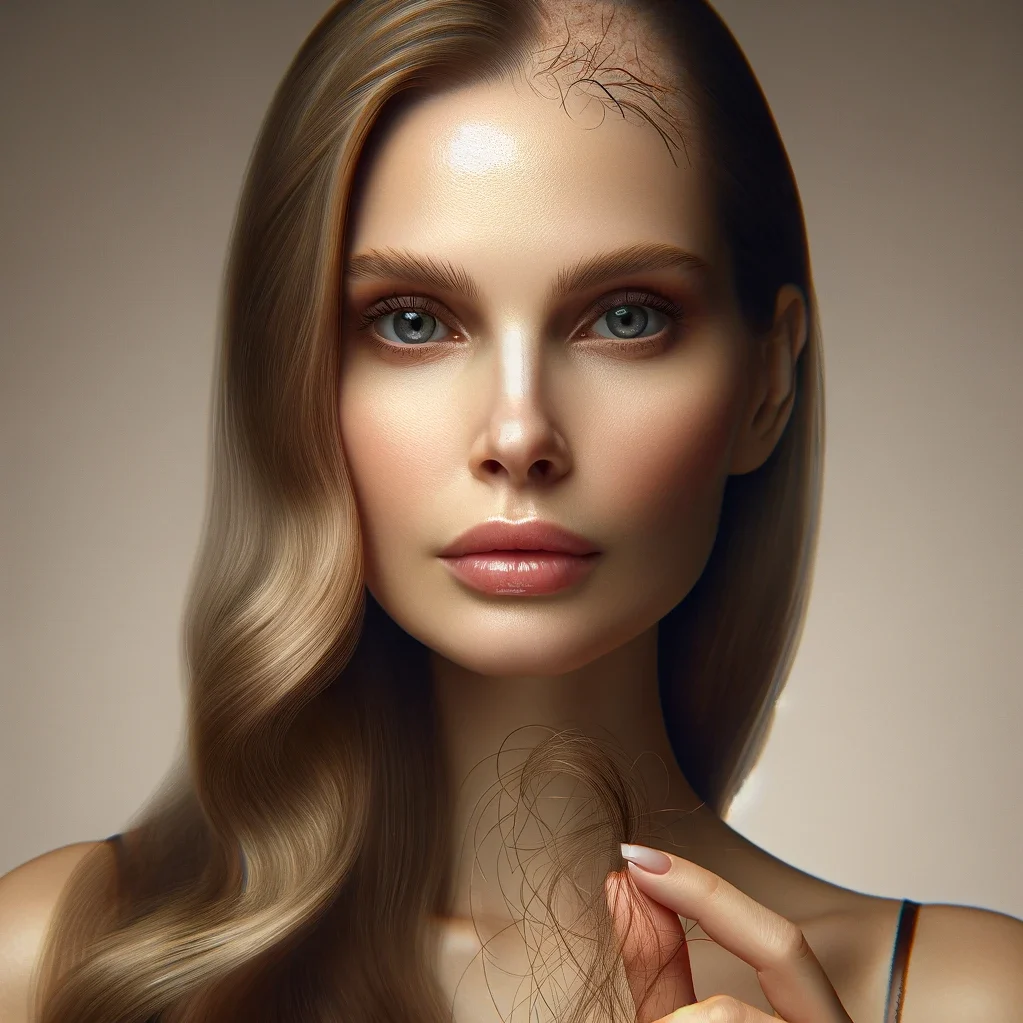Poor nutrition and nutrient deficiencies can have a significant impact on hair health and growth. The foods we consume play a vital role in promoting healthy hair growth while reducing stress levels. By incorporating stress reduction diets into our daily routines, we can nourish our hair from the inside out.
A well-balanced diet that focuses on hair growth includes essential vitamins and minerals such as B12, D, biotin, riboflavin, and iron. These nutrients have been linked to hair loss prevention and can help combat the negative effects of stress on our hair.
By incorporating stress reduction diets into our daily routines, we can nourish our hair and promote overall hair health. Let’s explore some of the key foods that reduce stress and promote hair growth.
Key Takeaways:
- Consuming a balanced diet that includes essential vitamins and minerals is crucial for hair growth.
- Foods such as eggs, berries, spinach, fatty fish, sweet potatoes, avocados, nuts, seeds, and sweet peppers are beneficial for promoting hair growth and reducing stress.
- Nutritional deficiencies in vitamins B12 and D, biotin, riboflavin, iron, and other nutrients can lead to hair loss.
- Eggs are an excellent source of protein and biotin, essential for hair growth.
- Berries, particularly strawberries, are rich in vitamin C and antioxidants that promote hair health and protect against oxidative stress.
The Importance of Nutritional Deficiency on Hair
The growth and health of hair are influenced by several factors, including age, genetics, environment, medications, and diet. Nutritional deficiencies, particularly in vitamins B12 and D, biotin, riboflavin, iron, and other nutrients, have been associated with hair loss.
“Proper nutrition plays a crucial role in maintaining healthy hair growth.”
When the body lacks these essential vitamins and minerals, the hair growth cycle can be disrupted. The hair follicles may enter a resting phase, leading to hair thinning and eventual hair loss.
To ensure optimal hair health and combat nutrient deficiencies, it is important to consume a diet rich in vitamins and minerals that promote hair growth.
Effects of Nutrients on Hair Growth Cycle
Various nutrients play significant roles in the hair growth cycle:
- Vitamin B12: Supports the production of red blood cells, which supply oxygen to the hair follicles. Deficiency can lead to weak and brittle hair.
- Vitamin D: Helps regulate hair follicle cycling and maintains hair density. Insufficient levels have been linked to hair loss.
- Biotin: A key nutrient for hair health, it promotes the production of keratin, the protein that makes up the hair shaft. Lack of biotin can lead to hair thinning and brittleness.
- Riboflavin: Essential for energy production in hair follicles. Low levels can impair hair growth and contribute to hair loss.
- Iron: Necessary for carrying oxygen to the hair follicles and promoting hair growth. Iron deficiency can result in thinning hair and hair loss.
By incorporating foods rich in these vitamins and minerals into your diet, you can support healthy hair growth and prevent hair loss caused by nutritional deficiencies.
Vitamins and Minerals for Hair Health
Here are some of the essential vitamins and minerals that contribute to hair health:
| Vitamin/Mineral | Food Sources | Function | Effects of Deficiency |
|---|---|---|---|
| Vitamin B12 | Meat, fish, dairy products | Aids in red blood cell formation and optimal oxygen supply to the hair follicles | Hair thinning, brittleness, hair loss |
| Vitamin D | Sunlight, fatty fish, fortified dairy products | Regulates hair follicle cycling and maintains hair density | Hair loss, reduced hair density |
| Biotin | Eggs, nuts, seeds, sweet potatoes | Promotes the production of keratin, the protein that makes up the hair shaft | Thinning hair, hair brittleness |
| Riboflavin (Vitamin B2) | Dairy products, leafy greens, lean meats | Energy production in hair follicles | Impaired hair growth, hair loss |
| Iron | Red meat, spinach, lentils | Carries oxygen to hair follicles, promotes hair growth | Thinning hair, hair loss |

Including these nutrient-rich foods in your diet can help strengthen hair follicles, improve hair quality, and promote optimal hair growth.
It’s important to note that while a healthy diet can support hair health, it may not completely reverse hair loss caused by genetic or medical factors. If you experience significant hair loss or suspect a nutrient deficiency, it’s advisable to consult with a healthcare professional.
The Power of Eggs for Hair Growth
Eggs are a highly beneficial food for promoting hair growth and maintaining hair health. They are packed with essential nutrients such as protein, biotin, zinc, and selenium, all of which play a vital role in supporting healthy hair follicles and stimulating hair growth.
Protein: Eggs are an excellent source of high-quality protein. Hair is primarily made up of protein, so consuming an adequate amount is essential for strong and healthy hair. Protein provides the building blocks for hair follicles, promoting their growth and repair.
Biotin: Biotin, also known as vitamin B7, is a crucial nutrient for hair health. It helps produce a hair protein called keratin, which is responsible for the structural integrity of hair strands. Eggs are a rich source of biotin, making them an ideal dietary addition for boosting hair growth.
Zinc and Selenium: Eggs contain significant amounts of zinc and selenium, two minerals that are essential for maintaining optimal hair health. Zinc contributes to the production of new hair cells and plays a vital role in keeping the scalp healthy. Selenium, on the other hand, helps protect hair follicles from damage caused by free radicals.
By incorporating eggs into your diet, you can provide your body with the essential nutrients it needs to promote hair growth and maintain healthy, lustrous hair.

Adding eggs to your meals is a simple and versatile way to harness their benefits for hair health.
“Eggs are a powerhouse of nutrients for hair growth, delivering essential protein, biotin, zinc, and selenium. Including eggs in your diet can help nourish your hair and support optimal hair health.”
Berries for Nourishing Hair Growth
Berries, particularly strawberries, are a powerhouse of nutrients that promote hair growth and overall hair health. These small and vibrant fruits are packed with vitamin C and antioxidants, making them an excellent addition to your diet for strong and luscious locks.
Vitamin C is essential for collagen production, a protein that strengthens and supports the structure of your hair. Adequate collagen production is crucial for maintaining healthy hair follicles and promoting optimal growth. By incorporating vitamin C-rich berries into your diet, you can help strengthen your strands from the inside out.
The antioxidants present in berries play a vital role in protecting your hair follicles from oxidative stress. Oxidative stress occurs when there is an imbalance between free radicals and antioxidants in the body, leading to damage to the hair follicles. By consuming antioxidant-rich berries, you can help safeguard your hair against oxidative stress, keeping it healthy and vibrant.
| Berries | Vitamin C Content (mg per 100g) | Antioxidant Capacity (ORAC value*) |
|---|---|---|
| Strawberries | 58.8 | 1540 |
| Blueberries | 9.7 | 4669 |
| Raspberries | 26.2 | 5065 |
| Blackberries | 21 | 4669 |
*ORAC value – Oxygen Radical Absorbance Capacity, a measure of antioxidant capacity
By incorporating a variety of berries into your diet, such as strawberries, blueberries, raspberries, and blackberries, you can provide your hair with the essential nutrients it needs to thrive. Enjoy them as a topping for yogurt or oatmeal, blend them into smoothies, or simply savor them as a delicious snack.
The Benefits of Spinach for Hair Health
Spinach is a nutrient powerhouse for hair growth, containing folate, iron, and vitamins A and C. These essential nutrients play a vital role in maintaining healthy hair and combating hair loss caused by nutrient deficiencies.
Folate, also known as folic acid, is a B-vitamin that promotes proper cell division and DNA synthesis. It aids in the production of red blood cells, which are responsible for delivering oxygen to the hair follicles. Adequate folate intake is crucial for optimal hair growth and can help prevent hair thinning and loss.
Iron is an essential mineral that helps carry oxygen to the hair roots and promotes healthy hair growth. Iron deficiency can lead to hair loss, as insufficient iron levels may disrupt the hair growth cycle. By incorporating spinach into your diet, you can ensure an adequate supply of iron to support vibrant and strong hair.
Vitamins A and C in spinach are also vital for hair health. Vitamin A promotes the production of sebum, the natural oil that moisturizes the scalp and prevents hair dryness and breakage. However, excessive intake of vitamin A can have adverse effects on hair health, so moderate consumption is recommended. Vitamin C, an antioxidant, aids in collagen production, which is essential for maintaining the strength and elasticity of hair strands.
Adding spinach to your diet can be as simple as incorporating it into salads, smoothies, or cooked dishes. By doing so, you can harness the benefits of folate, iron, and vitamins A and C to support your hair’s health and growth.
| Nutrient | Function | Sources |
|---|---|---|
| Folate | Promotes cell division and DNA synthesis, supports red blood cell production | Spinach, broccoli, asparagus, lentils |
| Iron | Carries oxygen to hair roots, promotes healthy hair growth | Spinach, red meat, legumes, tofu |
| Vitamin A | Promotes sebum production, moisturizes the scalp, and prevents hair dryness and breakage | Spinach, carrots, sweet potatoes, liver |
| Vitamin C | Aids collagen production, maintains hair strength and elasticity | Spinach, citrus fruits, strawberries, bell peppers |
“Spinach is not only delicious but also a fantastic source of essential nutrients for hair health. Its high folate, iron, and vitamin content can promote healthy hair growth and combat hair loss caused by nutrient deficiencies. Incorporating spinach into your diet is a simple and effective way to support your hair’s vitality and luster.”
Fatty Fish for Strong and Healthy Hair
Fatty fish, such as salmon, herring, and mackerel, are a valuable addition to a hair-healthy diet. These fish are rich in omega-3 fatty acids, protein, vitamin D3, and B vitamins, all of which play a vital role in promoting hair growth and maintaining strong and healthy hair.
The omega-3 fatty acids found in fatty fish are essential for the health of hair follicles. They help nourish the scalp, reduce inflammation, and improve the overall condition of the hair. Omega-3 fatty acids also support hair growth by improving blood circulation and ensuring adequate nutrient supply to the hair follicles.
Protein is another essential nutrient found in fatty fish that is crucial for hair health. Hair is predominantly made up of a protein called keratin, and consuming adequate amounts of protein is necessary to support its growth and strength.
In addition to omega-3 fatty acids and protein, fatty fish are an excellent source of vitamin D3 and B vitamins. Vitamin D deficiency has been linked to hair loss, making it important to maintain optimal levels of this vitamin. The B vitamins, including biotin and folate, also contribute to healthy hair growth and prevent hair loss caused by nutrient deficiencies.
Overall, incorporating fatty fish into your diet can help improve hair density, stimulate hair growth, and protect hair follicles. Including a variety of fatty fish in your meals can ensure you reap the full benefits of omega-3 fatty acids, protein, vitamin D3, and B vitamins for strong and healthy hair.
| Nutrients | Salmon (per 100g) | Herring (per 100g) | Mackerel (per 100g) |
|---|---|---|---|
| Omega-3 Fatty Acids | 2.5g | 2.7g | 2.6g |
| Protein | 22g | 18g | 21g |
| Vitamin D3 | 15.6mcg | 17.3mcg | 16.2mcg |
| Vitamin B12 | 4.9mcg | 18.2mcg | 19.0mcg |
Sweet Potatoes for Hair Nourishment
Sweet potatoes are a delicious and nutritious addition to your diet that can promote hair growth and support overall hair health. They are rich in beta-carotene, a compound that the body converts into vitamin A, a vital nutrient for hair growth.
Vitamin A plays a crucial role in stimulating hair follicles and promoting healthy cell turnover, which is essential for maintaining strong and vibrant hair. Additionally, vitamin A regulates sebum production, the natural oil that moisturizes the scalp and keeps the hair hydrated.
However, it’s important to consume sweet potatoes and other vitamin-A-rich foods in moderation. Excessive vitamin A intake can lead to hair loss, so it’s best to consult with a healthcare professional or nutritionist to determine the right amount for your specific needs.
Include sweet potatoes in your diet by roasting, baking, or mashing them. They can be enjoyed as a side dish, added to soups or stews, or even incorporated into desserts like sweet potato pie or muffins.
“Sweet potatoes are a versatile and nutrient-packed food that can contribute to the overall health of your hair, but it’s important to strike a balance in your vitamin A intake.”
Here is a table summarizing the key nutrients found in sweet potatoes:
| Nutrient | Amount per 100g |
|---|---|
| Beta-carotene | 8,509 mcg |
| Vitamin A | 14,187 IU |
| Vitamin C | 2.4 mg |
| Fiber | 3 g |
| Potassium | 337 mg |
| Manganese | 0.3 mg |
Adding sweet potatoes to your diet can provide these important nutrients, promoting sebum production and supporting the overall health of your hair. Remember to consume them in moderation as part of a balanced diet to maximize their benefits without exceeding the recommended vitamin A intake.
Conclusion
Achieving healthy hair growth and reducing stress go hand in hand. By following a balanced diet that incorporates stress reduction tips, you can promote optimal hair health and growth. By incorporating stress reduction diets for hair growth into your daily routine, you can nourish your hair and reduce the negative effects of stress on your hair follicles.
The best diet for healthy hair includes a variety of nutrient-rich foods. Foods such as eggs, berries, spinach, fatty fish, sweet potatoes, avocados, nuts, seeds, and sweet peppers provide essential vitamins, minerals, and antioxidants. These nutrients are vital for healthy hair follicles and combat hair loss caused by nutritional deficiencies.
Remember, a stress management diet paired with a focus on hair growth can have meaningful benefits. By consuming a well-rounded diet that includes foods that reduce stress and promote hair growth, you can support healthy hair growth and overall hair health. Take the first step towards healthier hair by incorporating stress reduction diets into your lifestyle today!
FAQ
Can a stress reduction diet help promote hair growth?
Yes, a balanced diet that includes nutrient-rich foods can play a vital role in promoting hair growth and reducing stress. Consuming the right vitamins, minerals, and antioxidants can nourish hair follicles and combat hair loss caused by nutrient deficiencies.
Which vitamins and minerals are important for hair health and growth?
Several vitamins and minerals are essential for hair health and growth, including B12, D, biotin, riboflavin, and iron. These nutrients have been linked to hair loss, and consuming a diet that includes foods rich in these vitamins and minerals can help combat hair loss and promote optimal hair growth.
How can eggs contribute to hair growth?
Eggs are an excellent source of protein and biotin, which are crucial for hair growth. Protein is a building block for hair follicles, while biotin aids in keratin production, a vital hair protein. Additionally, eggs also contain zinc, selenium, and other nutrients that promote optimal hair health and growth.
What makes berries beneficial for hair growth?
Berries, especially strawberries, are loaded with vitamin C and antioxidants. Vitamin C supports collagen production, which strengthens hair and aids in iron absorption. The antioxidants in berries help protect hair follicles from oxidative stress, keeping the hair healthy and promoting optimal growth.
How does spinach contribute to hair health?
Spinach is packed with folate, iron, and vitamins A and C, all of which are essential for hair growth. Folate and iron play crucial roles in proper hair growth and can help combat hair loss. Vitamin A promotes hair growth, but it’s important to consume it in moderation to avoid excessive intake, which can lead to hair loss.
What are the benefits of fatty fish for hair?
Fatty fish, like salmon, herring, and mackerel, are rich in omega-3 fatty acids, protein, vitamin D3, and B vitamins. These nutrients promote hair growth, improve hair density, and protect hair follicles. Vitamin D deficiency has been linked to hair loss, making fatty fish an essential part of a diet to support healthy hair growth.
How can sweet potatoes nourish hair growth?
Sweet potatoes are packed with beta-carotene, which the body converts into vitamin A. Vitamin A is essential for hair growth and also affects sebum production, keeping the hair healthy. However, excessive vitamin A intake can lead to hair loss, so it’s important to consume sweet potatoes and other vitamin-A-rich foods in moderation.
Is a balanced diet important for hair growth and stress reduction?
Yes, consuming a balanced diet that includes nutrient-rich foods like eggs, berries, spinach, fatty fish, sweet potatoes, avocados, nuts, seeds, and sweet peppers can promote hair growth and reduce stress. These foods provide essential vitamins, minerals, and antioxidants necessary for healthy hair follicles and combat hair loss caused by nutrient deficiencies. Incorporating a stress reduction diet into your daily routine can nourish your hair and promote overall hair health.

